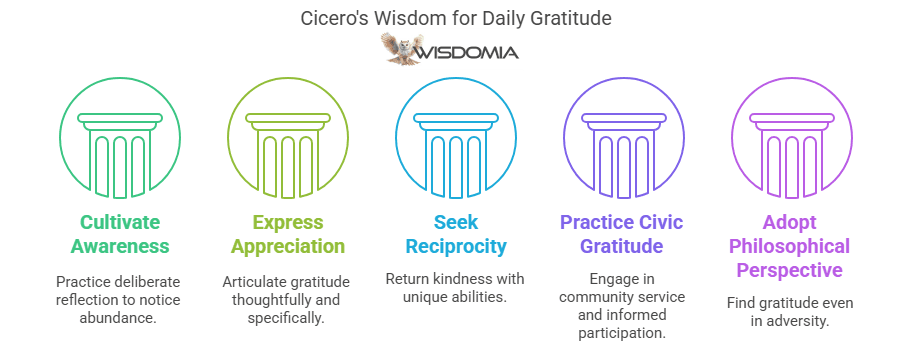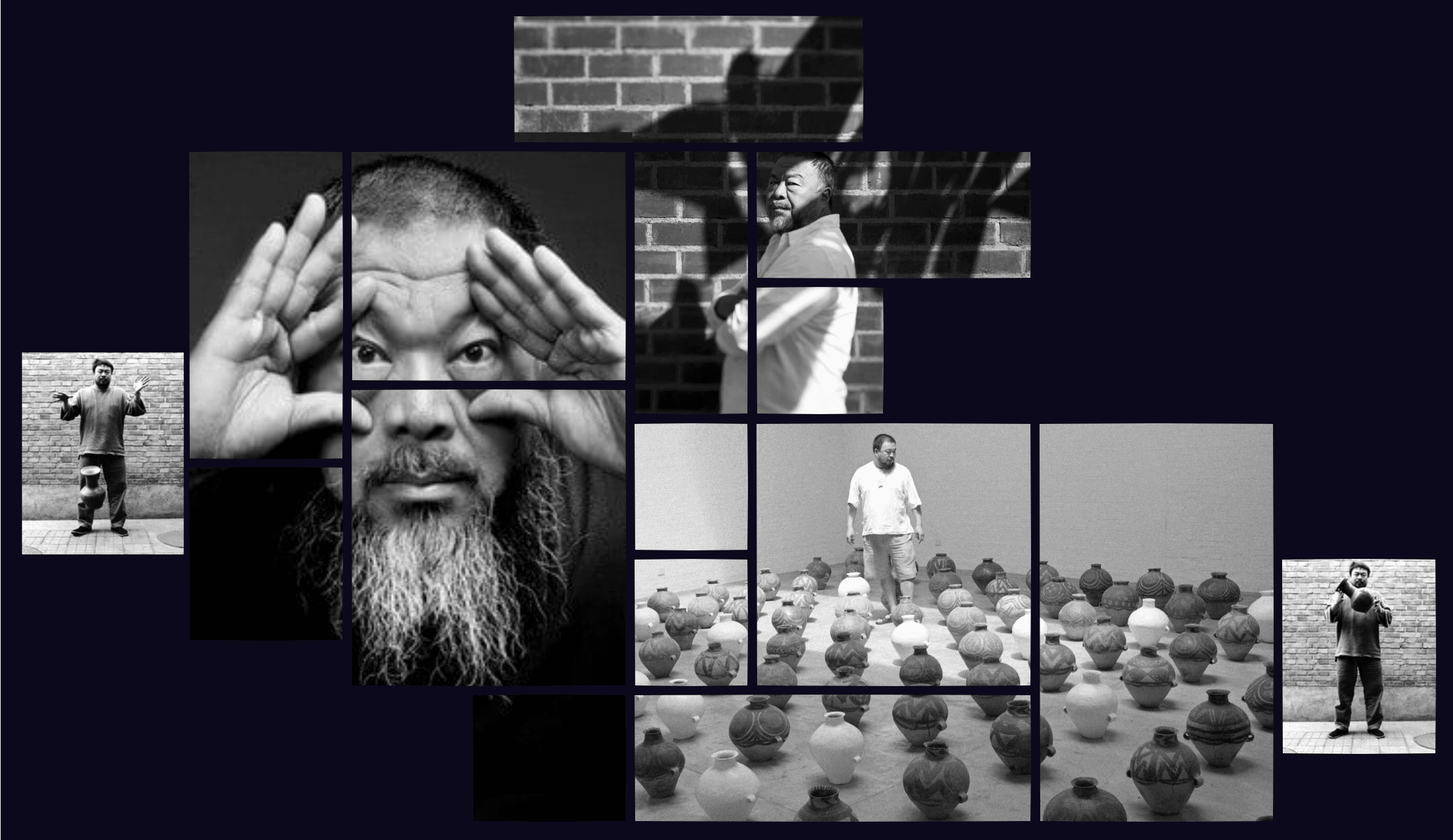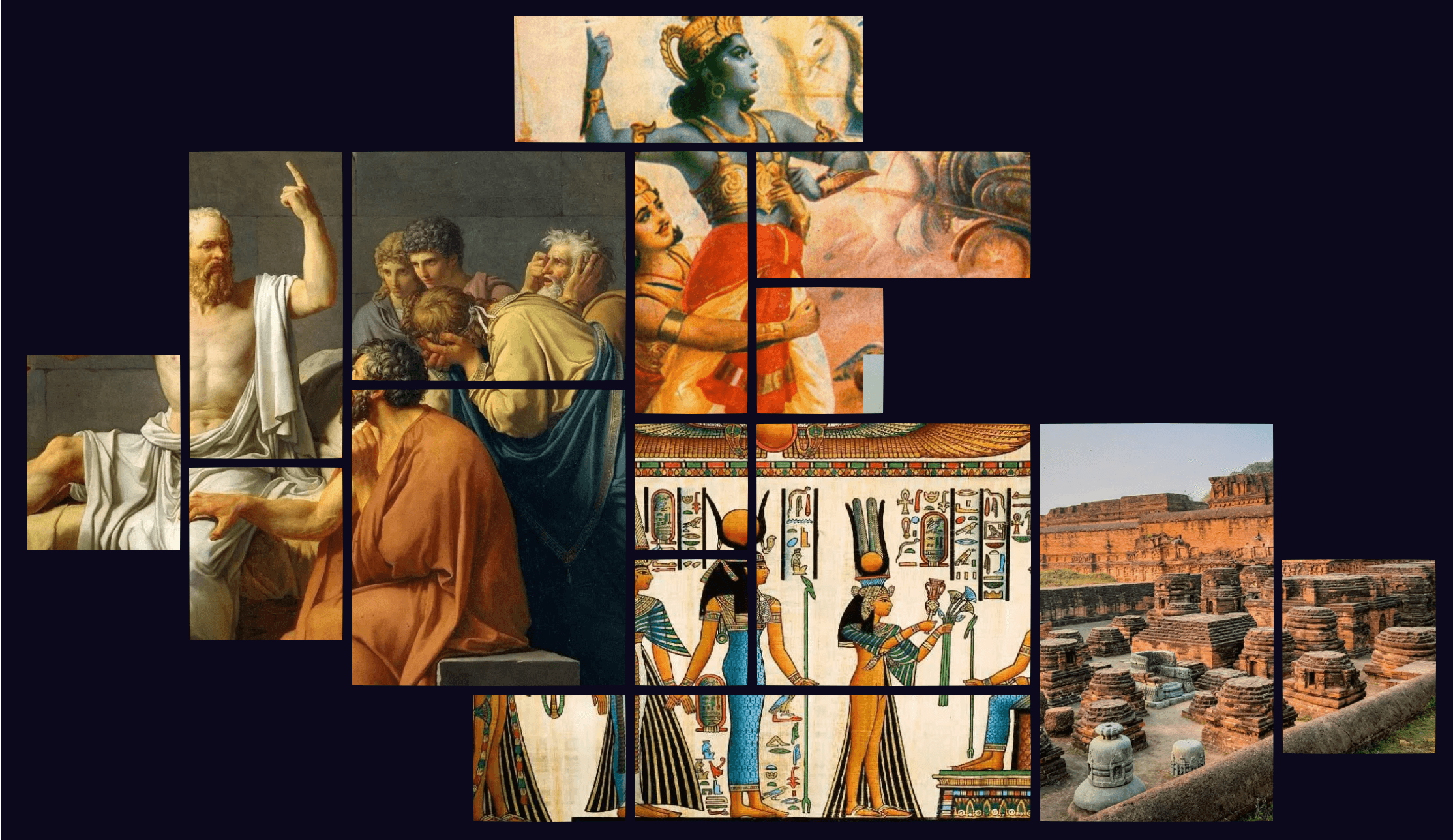What Cicero Can Teach Us About Gratitude Today
Hind MoutaoikiIR&D Manager
Thu May 01 2025

Marcus Tullius Cicero, offers a perspective that might illuminate our modern malaise. More than two millennia ago, this remarkable statesman and philosopher placed gratitude (gratia) at the very heart of human virtue, declaring it "not only the greatest of virtues, but the parent of all others."
In our relentless pursuit of progress and prosperity, we often find ourselves caught in a paradoxical state of discontent—surrounded by unprecedented comforts yet haunted by a sense that something essential remains beyond our grasp. Perhaps the ancient wisdom of Rome's greatest orator, Marcus Tullius Cicero, offers a perspective that might illuminate our modern malaise. More than two millennia ago, this remarkable statesman and philosopher placed gratitude (gratia) at the very heart of human virtue, declaring it "not only the greatest of virtues, but the parent of all others."
The Forgotten Virtue
Cicero lived in turbulent times not entirely unlike our own—an era of political upheaval, moral uncertainty, and rapid social change. Born in 106 BCE to a modest equestrian family, he rose through brilliance and perseverance to the highest offices of the Roman Republic. Throughout his storied career, he witnessed both the heights of human achievement and the depths of human folly. Yet amidst the tumult, he maintained a profound appreciation for what he considered life's true blessings: friendship, knowledge, civic harmony, and the natural order.
In his treatise De Officiis (On Duties), written as advice to his son, Cicero expounds upon gratitude as a cornerstone of justice and social cohesion. For him, gratitude was not merely a pleasant sentiment but a moral obligation—an acknowledgement of our interconnectedness and mutual dependency. "For there is no duty more indispensable", he wrote, “ than that of returning a kindness. All men distrust one forgetful of a benefit."
What wisdom might this ancient perspective offer to our modern hearts?
Gratitude as Resistance
In today's world of algorithmic discontent—where social media and advertising thrive by nurturing our sense of inadequacy—Cicero's emphasis on gratitude stands as a radical counter-cultural force. The Roman understood something we often forget: that gratitude is not merely a response to good fortune but a way of seeing that transforms our experience of reality itself.
When we scroll through carefully curated images of seemingly perfect lives or are bombarded with messages telling us we need more, newer, better, Cicero would counsel us to pause and recognise the abundance already present. This is not naive optimism but clear-eyed realism—an acknowledgement that our baseline expectations would appear miraculous to most humans who have ever lived, including the wealthy of Cicero's Rome.
"He who does not feel gratitude for the advantages he possesses," Cicero cautioned, "would not know how to bear the reversal of his fortunes." This insight speaks directly to our modern condition, where studies increasingly link gratitude practices to resilience against anxiety and depression. In cultivating appreciation for what we have, we build psychological resources that sustain us through inevitable hardships.
The Art of Recognition
For Cicero, gratitude began with recognition—with truly seeing the benefits we receive and acknowledging their source. This seems straightforward, yet it requires a mindfulness often lacking in our distracted age. How many gifts pass unnoticed in our lives? The morning light filtering through leaves, the infrastructure that delivers clean water to our taps, the countless hands that cultivated the food on our plates, the ancestors whose struggles secured our freedoms?
"Gratitude," Cicero wrote, "is not only the memory but the homage of the heart—rendered to those who have helped us." This homage requires presence and attention—qualities increasingly scarce in our notification-saturated existence. Perhaps this explains the curious emptiness many feel despite material plenty; we consume experiences without truly digesting them, receive benefits without acknowledging them.
The Ciceronian remedy is deceptively simple yet profound: pause, notice, savour. In his letters to friends, Cicero frequently catalogued simple pleasures and kindnesses with evocative detail—the hospitality of a country estate, the loan of books during exile, the eloquence of a speech delivered on his behalf. Each recognition deepened his experience and strengthened his bonds with others.
Beyond Sentiment: Gratitude as Action
For the Roman statesman, gratitude transcended mere feeling to become embodied practice. It was insufficient to feel thankful; one must demonstrate appreciation through reciprocal action. This aspect of Cicero's teaching challenges our modern tendency to compartmentalise gratitude as an interior emotional state rather than a social commitment.
"Memory is the treasury and guardian of all things," Cicero noted, emphasising that we must not only remember benefits received but respond to them appropriately. This response might take many forms—from simple acknowledgement to tangible reciprocation to paying the kindness forward to others. What matters is that gratitude completes a circuit, flowing outward from recipient to benefactor and beyond.
Imagine a society where this Ciceronian principle operated fully—where each benefit received created ripples of reciprocal action, weaving an ever-strengthening fabric of mutual regard and support. This vision stands in stark contrast to transactional models that increasingly dominate our social and economic interactions, where obligations are discharged through monetary payment alone, leaving human connections impoverished.
The Practice of Philosophical Gratitude
How might we incorporate Cicero's wisdom into our daily lives? The philosopher himself offers guidance through both his writings and example:

First, cultivate awareness through deliberate reflection. Cicero regularly reviewed the benefits and kindnesses he had received, often through letter-writing—an ancient equivalent of the gratitude journal recommended by modern positive psychologists. Setting aside time each day to catalogue gifts received, from the profound to the mundane, trains our perception to notice abundance rather than scarcity.
Second, express appreciation directly. Cicero's letters brim with eloquent acknowledgments of friends' generosity and loyalty. In an age of instant communication, we might recover the lost art of the thoughtful thank-you—taking time to articulate specifically what someone's kindness has meant to us, rather than offering perfunctory thanks.
Third, seek opportunities for reciprocity. When receiving kindness, Cicero looked for ways to return the favour, often through his oratorical gifts or political influence. While our means may differ, we too can consider how our unique abilities might benefit those who have helped us.
Fourth, practice civic gratitude. Cicero demonstrated appreciation for the Roman Republic through dedicated service, recognising that the freedoms he enjoyed entailed responsibility. Similarly, we might express gratitude for democratic institutions through informed participation, community service, and respectful engagement with fellow citizens.
Finally, adopt a philosophical perspective. Cicero's Stoic influences taught him to find gratitude even in adversity by focusing on what remains rather than what is lost. During his exile—perhaps his darkest hour—he wrote movingly of gratitude for loyal friends and the consolations of literature. This capacity to find thankfulness even in difficulty represents gratitude's highest expression.
A Timeless Invitation
Two thousand years after Cicero penned his reflections on gratitude, his wisdom beckons with renewed relevance. In a world where discontent drives consumption, where political discourse favours grievance over appreciation, where technological acceleration often outpaces our capacity for mindful acknowledgment, his emphasis on grateful recognition offers a timeless corrective.
The invitation is simple yet profound: to pause amidst our striving and truly see the abundance that surrounds us; to acknowledge our indebtedness to others with grace rather than resentment; to express appreciation not merely as sentiment but as action; to recognise that in the economy of gratitude, we become richer by acknowledging what we have received.
"To be grateful," Cicero reminds us across the centuries, "is to be happy." Not because gratitude denies life's genuine hardships or injustices, but because it orients us toward what nourishes rather than depletes the human spirit. It keeps alive our capacity for wonder and connection in a world that too often dulls both.
Today, as in Cicero's time, this ancient virtue offers not merely personal contentment but a foundation for social renewal—a way of seeing and being that might yet heal our divided communities and restore our sense of common purpose. The practice begins, as it always has, with simple recognition: for what, today, might you give thanks?
previous
The Tallest Trees in the World: Nature's Towering Giants
next
The Symbolical Meaning of Penguins: Wisdom from Earth's Elegant Wanderers
Share this
Hind MoutaoikiI
R&D Manager
Hind is a Data Scientist and Computer Science graduate with a passion for research, development, and interdisciplinary exploration. She publishes on diverse subjects including philosophy, fine arts, mental health, and emerging technologies. Her work bridges data-driven insights with humanistic inquiry, illuminating the evolving relationships between art, culture, science, and innovation.
More Articles

Understanding The Attachment Theory: Its Impact from Infancy to Adulthood

Elder Voices of the Millennium: Ai Weiwei

How Ancient Teachings Offer Timeless Wisdom for Navigating Modern Life

The Unique Mural Art of Morocco: Exploring the Stories and Symbols Behind the Walls
The Great Barrier Reef: Exploring the Future of Australia's Iconic Marine Ecosystem





